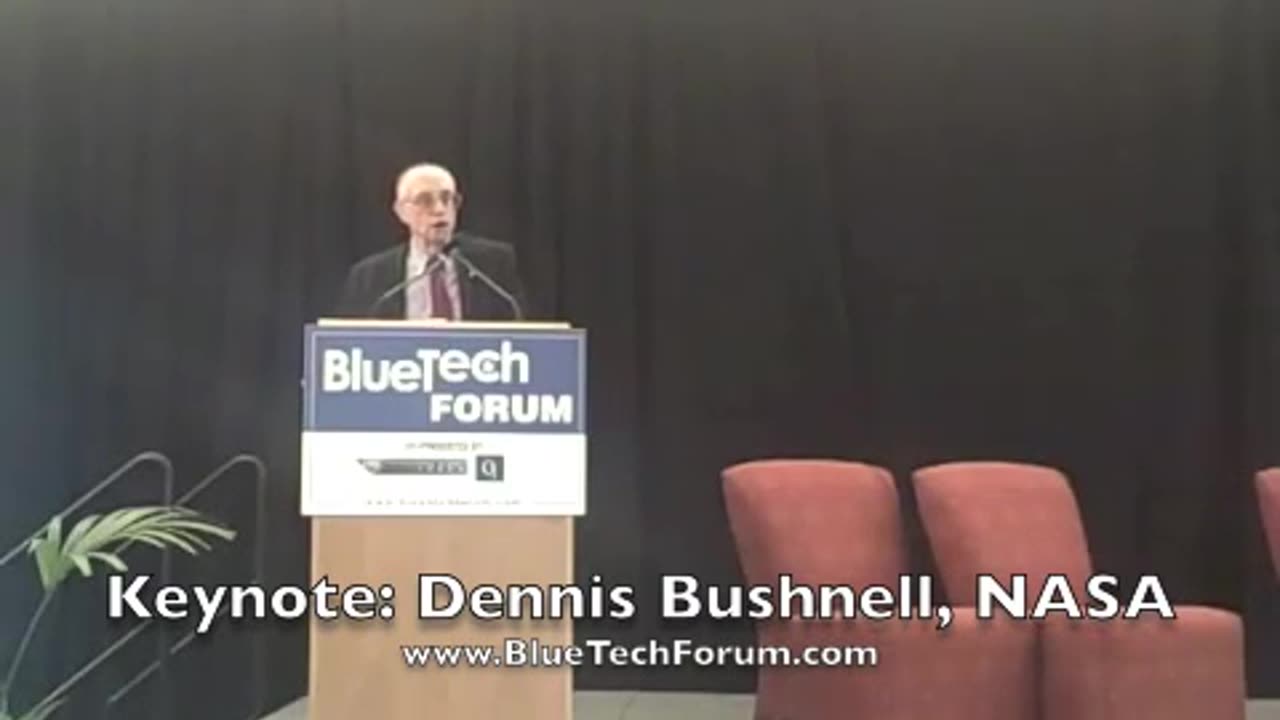Premium Only Content

BlueTech Forum 2011 - Keynote Presentation - Dennis Bushnell, Chief Scientist, NASA Langley
Dennis Bushnell, Chief Scientist at NASA Langley, delivered a keynote presentation at the BlueTech Forum 2011, covering a wide array of topics related to strategic water management, environmental sustainability, and technological innovation. His presentation delved into human impact on the environment, accelerated evolution due to human activity, climate change projections, and innovative solutions for sustainable agriculture and energy.
🌍 Human Impact and Evolution
The Human Era
Bushnell started by explaining the significant role humans have played in shaping the environment over the past million years. He highlighted the transition from hunter-gatherers to agricultural societies and the subsequent mechanization of agriculture, which drastically reduced the workforce involved in farming. This shift marked the beginning of the IT, bio, and nano age, where automation and technological advancements have significantly influenced industry and agriculture.
Accelerated Evolution
Humans have taken control of evolution, accelerating it to a rate 10 million times faster than natural processes. This rapid evolution includes genomic design and repair, designer children, and life forms, indicating a significant shift in the way humans interact with and control nature.
🔥 Climate Change Projections and Feedback Loops
IPCC Estimates
Bushnell referred to the Intergovernmental Panel on Climate Change (IPCC) estimates, which predict a temperature rise of 5 to 6 degrees Celsius and a sea-level rise of up to 2.6 meters by 2100. He emphasized that these estimates might be conservative, citing evidence that the Arctic could be ice-free in summer much sooner than previously thought.
Positive Feedback Mechanisms
The presentation highlighted several positive feedback loops that exacerbate climate change, such as methane releases from permafrost and ocean sediments, reduced ocean CO2 uptake, and changes in the Earth’s albedo due to ice melt. These feedback mechanisms are not fully accounted for in the IPCC models, suggesting that the actual impacts of climate change could be far more severe.
🌿 Seawater Agriculture and Halophytes
Halophytes as a Solution
Bushnell proposed seawater agriculture using halophytes (salt-tolerant plants) as a comprehensive solution to address food, water, and energy shortages. He explained that halophytes could be cultivated in deserts using seawater, providing a sustainable method for producing biomass, food, and biofuels.
Global Potential
He highlighted the vast potential of seawater agriculture, noting that significant portions of deserts like the Sahara could be transformed into productive land. This method could not only address food security but also mitigate climate change by reducing the need for freshwater in agriculture.
⚛️ Innovative Energetics
Low-Energy Nuclear Reactions (LENR)
Bushnell discussed the potential of LENR, originally dubbed cold fusion, as a game-changing technology for energy production. He explained that recent advancements have shown promising results, making LENR a viable alternative to traditional nuclear and fossil fuel-based energy sources.
Nanoplastic Photovoltaics
Another promising technology mentioned was nanoplastic photovoltaics, which offer cost-effective and highly efficient solar energy solutions. These advancements could significantly reduce the cost of solar power, making it a more accessible and sustainable energy source.
🌱 Ecosystem Collapse and Resource Shortages
Ecosystem Degradation
The keynote emphasized the ongoing degradation of ecosystems due to human activities, leading to biodiversity loss, pollution, deforestation, and topsoil erosion. Bushnell warned that these trends could lead to severe consequences for human survival if not addressed urgently.
Peak Resource Concerns
Bushnell highlighted the concept of peak oil, uranium, natural gas, and coal, indicating that the world is running out of cheap, easily accessible resources. This underscores the need for a transition to renewable energy sources and sustainable practices.
🔬 Advanced Agricultural Technologies
Genomic Engineering and Synthetic Biology
Advancements in genomic engineering and synthetic biology offer significant potential for enhancing agricultural productivity and sustainability. Bushnell discussed ongoing research in developing salt-tolerant crops and improving plant growth rates through biotechnology.
Biofuels and Bioconversion
He also emphasized the importance of biofuels and bioconversion processes, which can provide renewable energy sources and reduce dependence on fossil fuels.
🚀 Long-term Solutions: Terraforming and Cyborgs
Terraforming Mars
Bushnell briefly touched on the possibility of terraforming Mars as a long-term solution to Earth’s environmental challenges. While this concept is still theoretical, it highlights the need for innovative thinking in addressing future resource and environmental crises.
Human-Machine Integration
The keynote also explored the integration of advanced biotechnologies into human life, including cyborg enhancements and brain-machine interfaces. These advancements could potentially improve human capabilities and adaptability in a changing environment.
📈 Economic and Policy Shifts
Sustainability-Focused Economics
Bushnell urged a shift from growth-focused economics to sustainability-focused policies. He argued that the current economic model, which prioritizes short-term gains, is not compatible with the long-term survival of the planet and humanity.
Policy Recommendations
He recommended policy changes to promote sustainable practices, including incentives for renewable energy adoption, investments in advanced agricultural technologies, and stricter regulations on pollution and resource management.
Conclusion
Dennis Bushnell’s keynote at the BlueTech Forum 2011 provided a comprehensive overview of the environmental challenges facing humanity and the innovative solutions required to address them. He emphasized the critical need for strategic water management, sustainable agriculture, and advanced energy technologies to ensure long-term environmental and societal stability. Bushnell’s insights highlight the importance of adopting a holistic and forward-thinking approach to solving the pressing issues of climate change, resource depletion, and ecosystem degradation.
Quotes
1. On Human Impact and Evolution: “Humans have taken over and vastly shortened evolution. The human-engendered evolution which is going on now is 10 million times faster than any natural evolution.”
2. On Climate Change Projections: “The IPCC estimates based on really solid science predict that by 2100, we could see a temperature rise of five to six degrees Celsius and an ocean rise of up to 2.6 meters.”
3. On Positive Feedback Loops: “These positive feedbacks include massive amounts of fossil methane in the tundra and ocean. Methane is 22 times worse than CO2 in terms of its impact on climate change.”
4. On Ecosystem Collapse: “The ecosystem appears to be crashing. Freshwater shortages, species extinctions, and the emergence of fragile human-engendered monoculture biomes are some of the critical issues we face.”
5. On Resource Shortages: “Peak oil, uranium, natural gas, and coal highlight the urgency of transitioning to renewable energy sources.”
6. On Seawater Agriculture: “Utilizing halophytes for agriculture in deserts can address food, water, and energy shortages while also providing a sustainable method for biomass production.”
7. On Advanced Energetics: “Low-energy nuclear reactions, originally known as cold fusion, have shown promising results and could be a game-changing technology for energy production.”
8. On Nanoplastic Photovoltaics: “Nanoplastic photovoltaics offer a cost-effective and highly efficient solution for solar energy, with the potential to significantly reduce the cost of solar power.”
9. On Terraforming Mars: “We have looked at what it would take to terraform Mars, and it would take about 120 years to make the planet habitable with a reasonable depth ocean and breathable atmosphere.”
10. On Sustainability-Focused Economics: “The current measure of the wealth of a society is kilowatts produced per capita. This is not good. The second law of thermodynamics means we can’t generate energy from sources that produce new heat without facing severe warming consequences.”
11. On Policy Recommendations: “To promote sustainable practices, we need incentives for renewable energy adoption, investments in advanced agricultural technologies, stricter regulations on pollution, and support for research and development in innovative energetics and biotechnologies.”
12. On Future Economic Models: “The innate ecosystem restrictions and shortfalls will necessarily shift world econometrics from a growth mantra to one of sustainability, possibly with population control instigated along the way.”
13. On Human-Machine Integration: “We are merging with machines. The integration of advanced biotechnologies into human life, including cyborg enhancements and brain-machine interfaces, will significantly impact human capabilities and adaptability.”
14. On Strategic Planning: “The U.S. is terminally tactical as opposed to strategic. We need to adopt a more strategic, long-term approach to address the existential threats facing humanity.”
15. On Radical Innovation: “The battle is within – a culture between glorifying the past or marching toward the future, between protecting successes or cannabis, and between embracing risk or not. The battle is for the soul of this industry and the future of humankind.”
-
 3:02:59
3:02:59
PudgeTV
7 hours ago🔵 Mod Mondays Ep 46 | Cancel This Podcast
4.41K -
 1:57:39
1:57:39
Glenn Greenwald
7 hours agoDems & Media Still Blaming Everyone But Themselves, Especially Voters; Trump Bans Pompeo & Haley, Appoints Stefanik: What Does This Reveal About Next Admin? | SYSTEM UPDATE #364
164K79 -
 30:27
30:27
Stephen Gardner
4 hours ago🔥No FREAKING way! Trump makes BEST Decision of Presidency!
80.2K209 -
 1:15:22
1:15:22
Donald Trump Jr.
10 hours agoDelivering the Day One Agenda: No More Neocons, Plus Interview with Charlie Kirk | TRIGGERED Ep.190
174K368 -
 1:25:15
1:25:15
Flyover Conservatives
11 hours agoNailed It! Man Who Predicted all 56 Races Perfectly Explains Why Trump Won 2024! - Capt. Seth Keshel; Trump Wins: What’s Next for the U.S. Economy and Markets? - Dr. Kirk Elliott | FOC Show
30.2K -
 54:55
54:55
LFA TV
1 day agoTrump Cleans House | Trumpet Daily 11.11.24 9PM EST
22.8K2 -
 1:51:17
1:51:17
We Like Shooting
14 hours ago $3.56 earnedWe Like Shooting 584 (Gun Podcast)
24.5K -
 1:44:03
1:44:03
State of the Second Podcast
5 days agoColt INVENTED What? Historic Firearms Brought To Life (ft. Candrsenal)
22.5K3 -
 57:55
57:55
The StoneZONE with Roger Stone
4 hours agoTrump Sends Stefanik to UN, Sticker Mule CEO Anthony Constantino to Seek Her Seat? The StoneZONE
48.7K7 -
 2:20:17
2:20:17
WeAreChange
6 hours agoPANIC In "Dystopian Hellscape" DC! Kamala Can Still Be PRESIDENT
68.5K15